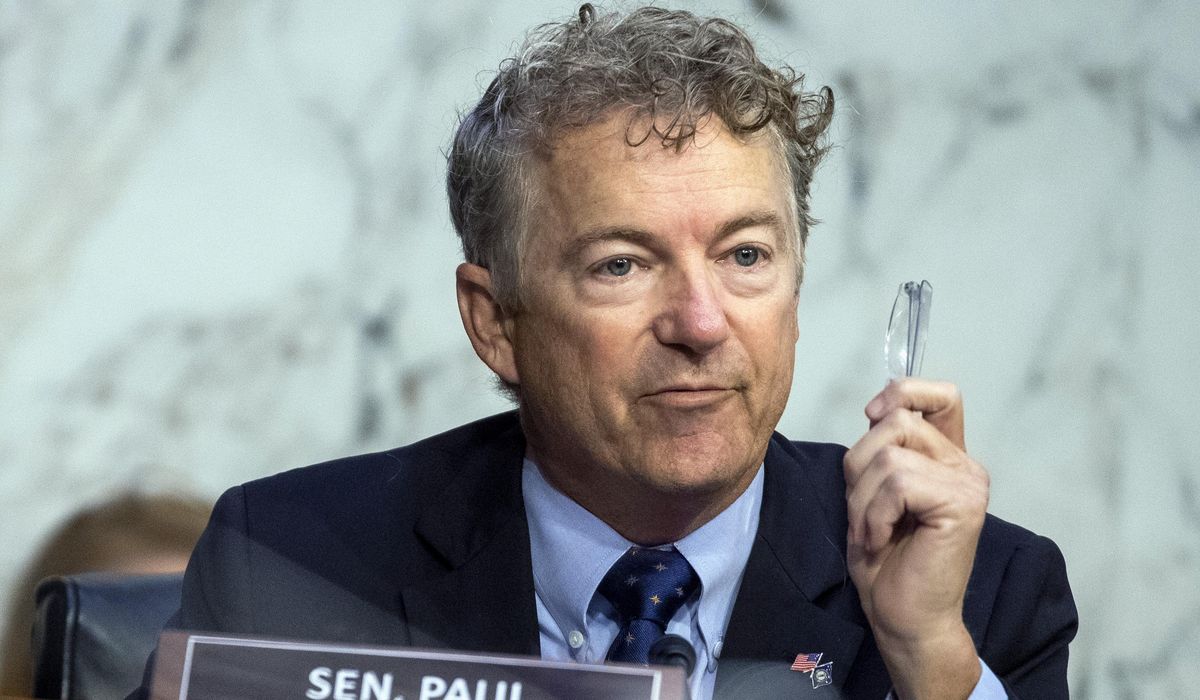

The limits of U.S. support for Ukraine have gone largely untested in Washington as President Biden defers to Kyiv to define the war’s end-state.
The House this week passed a fresh $40 billion military and economic aid package for Ukraine, adding $7 billion to the White House’s top line request. The new package brings total U.S. support for the war to nearly $54 billion once approved by the Senate.
But as lawmakers scramble to shuttle the much-needed aid out the door, a small group of lawmakers is asking how the war ends and how much it will cost.
“I think it’s an evolving mission already,” said Sen. Rand Paul, Kentucky Republican. “Before, I think we were trying to keep the Ukrainians from being defeated. Now, their foreign minister said in the last day or two, that the goal is removing the Russians from every aspect of the country, including Crimea.”
“You could see how with different goals it could be a long-drawn-out war,” he said. “It might ultimately be. You could see it being akin to the 20-year war in Afghanistan.”
President Biden has vowed to back Kyiv all the way while pledging that Ukraine alone will define its own victory. And the administration is banking on unwavering support for the war in Congress to keep the aid flowing.
“We believe Ukraine should define what victory means and our policy is trying to ensure Ukraine’s success,” Assistant Secretary of State for European and Eurasian Affairs Karen Donfried told members of the Senate Foreign Relations Committee on Thursday.
“We are committed to supporting Ukraine so that it can prevail in this conflict,” she said. “The tremendous bipartisan support we have in Congress for the assistance we’ve been giving, whether that’s security assistance, economic assistance, humanitarian assistance, puts us in an extremely strong position to stay the course … as it looks like this war, quite tragically, may grind on for still some time to come.”
Ukrainian officials have set a high bar in recent public statements, calling for the complete expulsion of Russian troops from their territory, including in the Crimean Peninsula, which Russia annexed in 2014, and the Donbas region, which has remained at a stalemate since the same period.
Rep. Adam Smith, Washington Democrat and chair of the House Armed Services Committee, echoed the administration’s standpoint on the U.S. not getting in the way of Ukraine’s negotiations, but said he trusts that the administration is engaging with Ukraine to define a clear end-state.
“We’re not negotiating for Ukraine,” he said. “They’re going to have to decide.”
“Now on a diplomatic level, not in a public manner, we should be having conversations about what the end-state looks like,” he said. “And I trust that our diplomats are doing this.”
While the majority of lawmakers remain steadfast in their support for Ukraine – the latest aid package garnered unanimous support from House Democrats and most Republicans — fissures have grown wider within the GOP over funding the war as it drags on.
In a speech on the House Floor Wednesday, Rep. Matt Gaetz, Florida Republican, blasted his colleagues for spending billions more on the war in Ukraine than Congress spends on the U.S. Customs and Border Patrol — a common refrain from some Republicans since tensions began to increase on Ukraine’s border over the winter.
He also lamented Congress’ “dangerous bipartisan consensus that is walking us into war with Russia.”
Mr. Gaetz was one of 57 Republicans to vote against the latest aid package.
Rep. Chip Roy, Texas Republican, was another dissenter.
“The idea that we’re going to say ‘here’s $40 billion,’ then you go see the parameters, that’s a blank check,” he said. “I mean, it’s just open-ended.”
Mr. Paul blocked the Senate’s attempt to fast-track the aid on Thursday over his push to include language in the bill that would create a special inspector general to oversee the disbursal of aid to Ukraine.
During his floor speech on the measure, he raised further concerns about U.S. spending for the war amid economic uncertainty at home.
“My oath of office is to the U.S. Constitution, not any foreign nation … We cannot save Ukraine by dooming the U.S. economy,” Mr. Paul said. “It isn’t that we always have to be the Uncle Sam, the policeman that saves the world, particularly when it’s on borrowed money.”
Mr. Smith said the dissent over the aid package is a reflection of a growing rift in the Republican Party but said it was notable that far more Republicans supported the package than did not.
Still, Mr. Smith acknowledged that the U.S.’s capacity to support Ukraine “is not limitless.” And while he does not expect another request for aid, he said it is not completely out of the question.
“That’s a really hard question to answer,” he said. “Forty billion dollars is a lot of money. I don’t anticipate another ask, but it wouldn’t shock me if it happened.”
